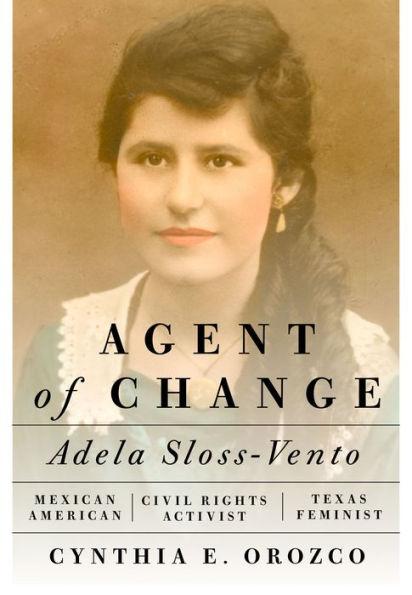
BIOGRAPHY
Cynthia E. Orozco
Agent of Change: Adela Sloss-Vento, Mexican American Civil Rights Activist and Texas Feminist
University of Texas Press
Hardcover (also available as an e-book), 978-1-4773-1986-4, 272 pgs., $40
January 10, 2020
Adela Sloss-Vento’s activist career from 1927 to 1990 is remarkable because of the many barriers she faced. Women were not invited to participate in political discussions for many years, yet Adela still corresponded with influential male leaders, including several presidents of the United States and Alonzo S. Perales, who was an “attorney, diplomat, public intellectual, LULAC principal founder, and activist.”
Adela built these relationships not through loud protests but through pen and paper. Letters and opinion pieces were her weapons in advocating for equal and fair treatment of women and people of color, specifically Mexican immigrants and US citizens of Mexican descent. Unfortunately, Adela typically directed the spotlight away from herself and has consequently remained largely unremembered or unknown.
Agent of Change: Adela Sloss-Vento, Mexican American Civil Rights Activist and Texas Feminist by Cynthia E. Orozco presents a compelling argument that Adela Sloss-Vento deserves a place of honor in American history, especially Texas history, as a passionately persistent activist and archivist of the Mexican American civil rights and Chicano movements. Orozco’s construction of this well-researched biography is primarily academic, with a detailed introductory thesis, overall conclusion, comprehensive bibliography, and seven chapters chronicling Adela’s decades-long achievements as a champion for equality. This extensive narrative showcases a woman who fearlessly and indefatigably pursued her goal to foster awareness and effect change, even when her endeavors were either ignored or indiscernible.
Orozco’s personal and academic objective to bring Adela some well-earned notoriety is a result of thorough research, interaction with Adela before her death, and access to Adela’s archives. Additionally, Adela’s son, Arnoldo Vento, shared his memories and anecdotes of his mother with Orozco, providing a more intimate layer to this view of a woman who chose to remain not necessarily in the shadows but on the edge of that patriarchal panorama, armed with her pen, her convictions, and her desire for equality because “She was both a political insider and a gendered outsider.”
In addition to examining and promoting Adela’s life and activism across almost seven decades, Orozco meticulously describes the political landscape during the years in which women had almost no direct access. The League of United Latin American Citizens (LULAC) was formed in 1929 by Hispanic veterans of WWI, including Perales. As a woman, Adela would never be admitted to the male-dominated LULAC, but she remained an ardent supporter of the organization’s political and humanitarian agenda. Moreover, she remained a firm defender, friend, and correspondent of Perales until his death in 1960.
Today’s society can benefit from Orozco’s work by learning who Adela Sloss-Vento was and understanding her painstaking contributions, promoting gender equality and racial desegregation. As a bilingual US-born citizen of Mexican heritage, Adela believed that learning Spanish and appreciating Mexican culture would foster unity, inclusion, and tolerance in all communities and among leaders with political power. Adela is admirable for her commitment to activism, and her story is timely and relevant because, while many changes have occurred since she took up her pen and adopted her activist role, the battle for equality and inclusion in the United States continues to rage.
Both current and future generations can learn from Adela’s dedication to her beliefs and causes because, in an age where instant gratification is both demanded and expected, it can be easy to forget that effecting change often requires steadfastness and continued focus, with the knowledge that even miniscule acts are important building blocks to progression, and that personal recognition should never be the end prize.
Courageous people, such as Adela Sloss-Vento, should be celebrated and not forgotten or left out of history books. Adela is a true hero and agent of change because of her diligence, endurance, and tenacity to cultivate equality and fairness.
Cynthia E. Orozco is a professor of history and humanities at Eastern New Mexico University, Ruidoso. She has written more than a hundred encyclopedia articles and more than a hundred newspaper articles. Orozco is the author No Mexicans, Women, or Dogs Allowed: The Rise of the Mexican American Civil Rights Movement, Agent of Change: Adela Sloss-Vento, Mexican American Civil Rights Activist and Texas Feminist, and Alonso S. Perales, Architect of Latino Destiny (Arte Publico Press, forthcoming); editor of Latinas in the United States: An Historical Encyclopedia; and coeditor of Mexican Americans in Texas History. She is a Texas State Historical Association Fellow, two-time Ford Foundation Fellow, and a New Mexico LULAC Educator of the Year.
